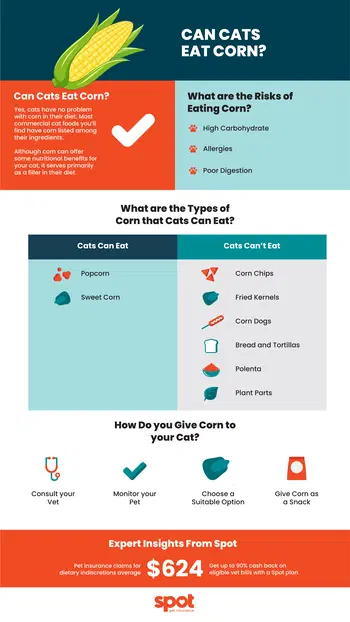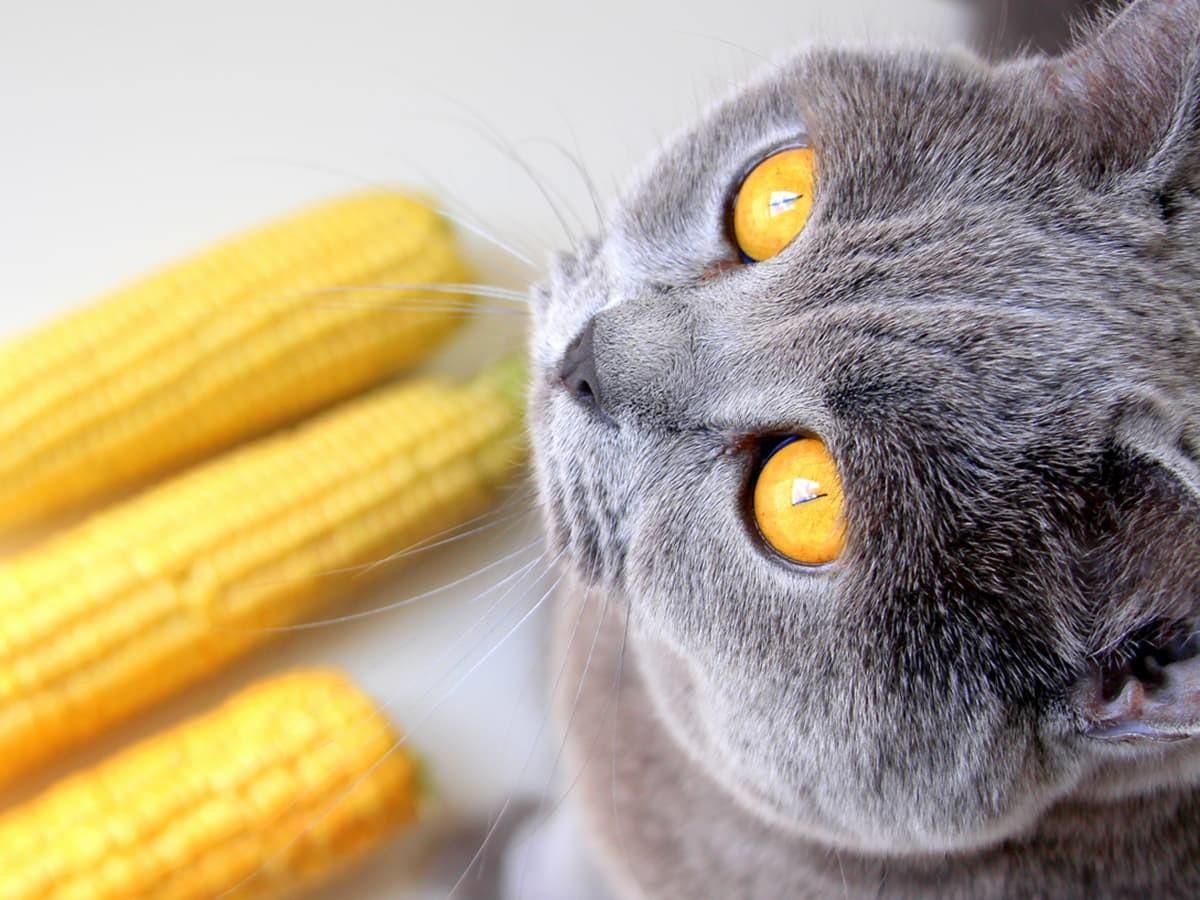Do you have commercial cat food at home? Turn it over to check the ingredients section, and you’ll likely see corn listed. Does this mean that cats can eat corn safely?
Read on as Spot Pet Insurance dives into this topic.
Can Your Cat Eat Corn?
Yes, cats have no problem with corn in their diet. Most commercial cat foods you’ll find have corn listed among their ingredients. It’s mostly a filler ingredient, which means your cat may be eating more corn than you realize.1
However, just because corn is in cat food doesn’t mean it should be all they eat. Cats are carnivores, so it’s their nature to eat meat. A diet devoid of meat deprives your cat of proper nutrition and can have devastating consequences for their health.
Although corn can offer some nutritional benefits for your cat, it serves primarily as a filler in their diet. It should accompany a largely meat-based diet to ensure that your cat isn’t missing out on essential nutrients.
What Are The Risks Of Eating Corn?
Corn may be considered safe for consumption by your cats, but it’s not without risks. Here are the potential challenges of feeding your cat corn:
High in Carbohydrates
Cats don’t need as many carbohydrates as humans because they don’t digest them easily. If your cat already has health issues, the blood sugar spike from eating high-carb foods could be dangerous. It’s best to consult your vet about your cat’s health status before feeding them corn.2
Allergies
Some cats have allergies to corn, so you must be cautious about introducing it to your pet. If your cat is vomiting, sneezing, scratching excessively, coughing, or having diarrhea, they might be having an allergic reaction.3
Cats may also have gluten intolerance due to the zein in corn. They may have signs such as weight loss, diarrhea, bloating, and fatigue.4
Poor Digestion
Cats may have trouble absorbing vitamins from corn due to the presence of phytic acid. Several processing techniques such as soaking and fermenting remove phytic acid for easier digestion, but they may also cause nutrient loss.
What Are The Types Of Corn That Cats Can Eat?
There are several corn dishes, but not all of them are safe for your cat. Here are some of the most popular foods from corn:
Popcorn
Popcorn is a quick snack, and cats tend to love it. It offers no nutritional value to your pet, but you can give them a few pieces. Choose the versions without seasoning for your cat because they don’t need to be eating butter, garlic, or lots of salt. Make sure that your cat never consumes an unpopped kernel.
Sweet Corn
You can boil or grill sweet corn for your cat. Remember to remove the corn from the corn cob and let it cool before serving.
This helps make it easier for your cat to consume. It also retains most of its nutrients when prepared this way.
Corn Chips
Your cat will have to pass on the corn chips. They’re usually heavily salted or contain preservatives that may harm their health. The added spices are not recommended to be consumed by cats.
Fried Kernels
These are a no-no for cats. Packaged fried corn kernel snacks are very high in sodium and fat. Both of these are bad news for your cat’s health.
Corn Dogs
Although corn dogs seem like the perfect snack because of their meaty center, they’re not. The batter is terrible for a cat’s health, and the sausage core isn’t any better. Therefore, this is another corn snack you should skip.
Bread and Tortillas
Just because they are made from corn doesn’t make them safe for cats. Bread and tortillas fill up your tiny kitten’s tummy, which may keep them from eating nutritious foods. This means no tortillas, tacos, and quesadillas for your cats.
Polenta
Polenta is another corn product that you shouldn’t feed your cats. It often contains lots of seasoning that could be toxic to your pet. It’s also filling to the point that your cat may be deprived of essential nutrients.
Plant Parts
If you have a garden, your cat might wander in and chew on parts of the corn plant. They aren’t directly toxic but can affect their gut.2 Find ways to keep your cat out of your garden so that they don’t eat plant parts.
Why Is Corn Found In Cat Food?
Corn isn’t in cat food to give them extra nutrients; instead, it serves as a filler ingredient. Cat foods that contain too much corn might be of low quality. If you have a cat, ensure their food contains more proteins than filler ingredients.
How Do You Give Corn To Your Cat?
Here are steps you should take before giving your cats corn:
Consult Your Vet
Corn isn’t directly poisonous to your cat, but eating too much can make your pet miss out on getting proper nutrition. Also, some cats have health conditions that require limiting their carbohydrate intake. Therefore, before feeding human food to your cat, ask your vet to make sure it’s okay.
Monitor Your Pet
Not every cat will respond positively to eating corn. Some may have allergies that cause unpleasant symptoms such as vomiting, diarrhea, sneezing, and coughing. If your cat responds this way to corn in their meal, you may have to remove it entirely from their diet.
Cats can develop allergies at any time, so you should remain vigilant. If their response is severe, a vet appointment might be necessary.
Choose A Suitable Option
Not all types of foods containing corn are suited for cats. Some contain toxic ingredients that shouldn’t feature in your cat’s diet. The processing methods also affect how well your cat can tolerate the food. Avoid store-bought corn snacks because they’re generally worse for your pet.
Give Corn As A Snack
Cats don’t need too many carbohydrates in their food. Proteins should take center stage. This is why corn should only serve as a snack for your pet.
Your cat’s daily diet should not contain more than 10% of their calorie intake from snacks.5 Keep this in mind the next time you’re giving your pet some popcorn or sweet corn.

Expert Insights From Spot
While sharing our favorite foods with our pets can be tempting, it's important to remember that not all human foods are safe for cats. Spot's internal data shows that pet insurance claims for dietary indiscretions average $642*, highlighting the importance of caution and research before sharing snacks with your pet.
Conclusion
Corn is a non-toxic vegetable, so your cats can enjoy it in moderation. They’ve probably been eating corn all along because it’s an ingredient in many popular cat foods. Corn is mostly carbohydrate which doesn’t fully meet your cat’s dietary needs. They need more protein and healthy fat to help them stay healthy.
Corn mostly serves as a filler In cat food because it doesn’t offer many nutritional benefits. Therefore, limit how much corn makes it to your cat’s diet. Snacks such as popcorn should only make up 10% of their diet.
Not all types of corn meals are great for cats. Foods that you should keep away from your pet or only give sparingly are corn dogs, fried kernels, tortillas, bread, polenta, and corn chips. On the other hand, your cats have no trouble enjoying sweet corn or popcorn.
Consult your vet if you want to help your cat enjoy corn safely. This can be especially crucial for cats with health problems that restrict their carbohydrate intake. Monitor your pet for allergies or gluten intolerance after feeding them corn. If you have questions about pet insurance, ask Spot Pet Insurance.

I've had the privilege of immersing myself in the realm of pet safety. As the owner of an energetic mini golden doodle, I know just how stressful being a pet owner can be. I am dedicated to ensuring our beloved pets enjoy a life brimming with good health.
*Jan 2019 to Aug 2024 administrator claims data.
Sy, Aurus. “Can Cats Eat Corn?” Wag Walking, 21 June 2022, wagwalking.com/wellness/can-cats-eat-corn.
Mitchell, Sandra C. “Can Cats Eat Corn?” PetMD, 01 Dec. 2023, www.petmd.com/cat/nutrition/can-cats-eat-corn.
“Food Allergies.” Cornell University College of Veterinary Medicine, n.d., www.vet.cornell.edu/departments-centers-and-institutes/cornell-feline-health-center/health-information/feline-health-topics/food-allergies.
“Zein,” ScienceDirect Topics, 2022, www.sciencedirect.com/topics/agricultural-and-biological-sciences/zein.
“Cat Treats: VCA Animal Hospitals.” VCA Animal Hospitals, n.d., vcahospitals.com/know-your-pet/cat-treats.
The information presented in this article is for educational and informational purposes only and does not constitute or substitute for the advice of your veterinarian.












